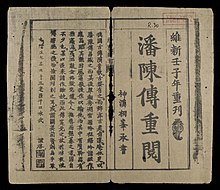
Phan Trần (Vietnamese: Phan Trần truyện, chữ Hán: 潘陳傳) is an anonymous Vietnamese language epic poem in lục bát verse originally written in chữ Nôm. It was first transcribed into the Latin-based modern Vietnamese alphabet in 1889.
There was a saying that "Men should not talk about the story of Phan Trần, women should not talk about The Tale of Kiều," because the plot of Phan Trần concerns romantic emotions of a man, Phan Sinh, who falls in love with Diệu Thường, a girl from the Trần family even though his parents have arranged another marriage.
| Vietnamese Alphabet (chữ Quốc Ngữ) |
|---|
| Trên am thong thả sách, cầm, |
| Nhàn nương án ngọc, buồn ngâm quyển vàng. |
| Thấy trong triều Tống Tĩnh khang, |
| Một chàng Hòa quận, một chàng Đàm chu, |
| Bảng vàng, bia đá nghìn thu, |
| Phan, Trần hai họ, cửa nho dõi truyền. |
| Kể từ đèn sách thiếu niên, |
| Một song tình nặng, một thuyền nghĩa sâu. |
References
- Florence Bretelle-Establet Looking at It from Asia: The Processes That Shaped the Sources of History of Science, New York, Springer 2010 "Vietnam's most famous work of literature The Tale of Kiều, the anonymous epic poem Phan Trần and many of the poems of Nguyễn Trài, Nguyễn Bỉnh Khiêm, and Hồ Xuân Hương were originally written in Nôm ..."
- professor Hoàng Xuân Việt, Nguyễn Minh Tiến Tìm hiểu lịch sử chữ quốc ngữ Page 401 "Rồi từ đó ông tiếp tục phiên âm, xuất bản hàng loạt tác phẩm Hán, Nôm như: Gia Huấn Ca, Nữ Lưu (1882), Lục Súc tranh công (1887), Phan Trần truyện (1889), Lục Vân Tiên (1889). Công việc phiên âm chữ Nôm ra chữ Quốc ngữ mà hiện ..."
- Shawn Frederick McHale Print and Power: Confucianism, Communism, and Buddhism in the ... 2004 - Page 28 "Nguyễn Xuân Nghị presents the story as a reflection on the saying "men should not tell the story of Phan Tran, women should not tell the Tale of Kieu." Unexpectedly one day, while wandering aimlessly down the street, I met a man carrying ... the names of old stories: "Hoa tiên," "Pham Cong," "Cue Hoa," "Nữ Tú Tài," "Kim Vân Kiều ," "Nhi Do Mai," "Phan Tran." ."
This article related to a poem is a stub. You can help Misplaced Pages by expanding it. |